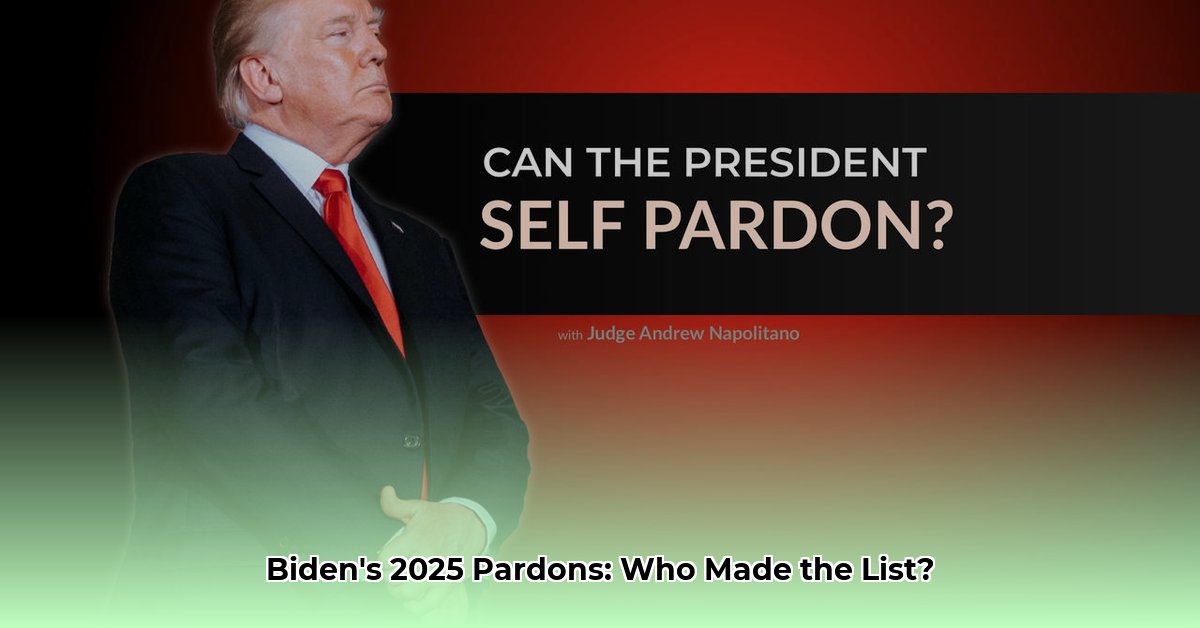The Pardons: A Last-Day Surprise
On his final day in office, January 20, 2025, President Biden issued a series of preemptive pardons, granting clemency to individuals before they faced any formal charges. Biden cited concerns about potential politically motivated investigations under the incoming Trump administration as his rationale. This unprecedented move immediately ignited a firestorm of controversy, raising fundamental questions about the scope of presidential power and the potential for its abuse.
Timeline of Events
- January 6, 2021: Attack on the U.S. Capitol.
- 2021-2022: January 6th Committee investigates the attack.
- November 2024: Donald Trump wins the presidential election.
- January 20, 2025: President Biden issues preemptive pardons.
Who Received Clemency?
| Individual Pardoned | Role/Relationship to Biden | Potential Reason for Pardon |
|---|---|---|
| Gen. Mark Milley | Former Chairman of the Joint Chiefs of Staff | Actions during the Trump presidency and January 6th, including concerns about Trump’s mental state. |
| Dr. Anthony Fauci | Former Director of NIAID | Decisions related to the COVID-19 pandemic response. |
| Members of the January 6th Committee (including Liz Cheney, Adam Kinzinger, Adam Schiff) | Congressional Representatives | Participation in the investigation of the January 6th Capitol attack. |
| James Biden, Frank Biden, Valerie Biden Owens, and their spouses | Biden family members | Potential investigations into business dealings. |
| Leonard Peltier | Native American activist | Commutation of sentence; longstanding controversy surrounding his 1975 conviction. |
Deconstructing the Rationale: Biden’s Justification
Biden defended the pardons as a necessary safeguard against what he characterized as potential “political witch hunts” under the Trump administration. This rationale, while seemingly protective, did little to quell criticism. Some analysts suggest this act potentially reflects Biden’s deep concern about the politicization of the justice system, viewing it as a necessary, albeit controversial, step to protect individuals from unfair prosecution. This perspective, however, remains contested.
Legal Basis and Precedent: Uncharted Territory
The Constitution grants the president broad pardon powers under Article II, Section 2, Clause 1. However, the legality of preemptive pardons remains murky. There is limited historical precedent, which raises questions about the extent of this power. Some legal scholars argue that Biden’s actions may have expanded the traditionally understood boundaries of the pardon power, potentially setting a new and possibly troublesome precedent for future presidents. Others contend that the lack of explicit prohibition implies permissible use, particularly in situations perceived as protecting against political persecution.
Controversy and Reactions: A Nation Divided
Predictably, the pardons sparked immediate and intense backlash. Trump advisor Corey Lewandowski, among others, condemned the decision as an overreach of executive authority. Conversely, supporters lauded Biden’s actions as a courageous defense against potential abuses of power.
- Critics: Argued that the pardons obstructed justice, shielded individuals from accountability, and set a dangerous precedent. Some questioned the fairness of preemptively pardoning family members, raising concerns about potential conflicts of interest.
- Supporters: Maintained that the pardons were a necessary measure to protect individuals from politically motivated prosecutions. They emphasized the importance of safeguarding against potential abuses of power within the justice system.
Historical Context: Echoes of Nixon
The 2025 pardons inevitably drew comparisons to Gerald Ford’s pardon of Richard Nixon. Both acts, while distinct in their circumstances, raise similar questions about the proper use of the pardon power and its potential for political manipulation. While Ford pardoned Nixon after impeachment proceedings, Biden’s preemptive approach adds a new dimension to the debate. Some scholars suggest this distinction is crucial, arguing that Biden’s actions were preventative, whereas Ford’s addressed a known offense. Further research may shed light on the long-term implications for the pardon power itself.
Implications and Unanswered Questions: A Legacy Yet to Be Written
The long-term consequences of Biden’s 2025 pardons remain uncertain. Did these actions permanently reshape the understanding of presidential power? Will they embolden future presidents to issue preemptive pardons? These questions, among others, continue to fuel ongoing debate and analysis. It’s probable that legal challenges and scholarly examination will further shape our understanding of this historical moment.
Conclusion: A Lasting Impact
Biden’s 2025 pardons represent a significant and controversial moment in American history. They raise crucial questions about the balance between executive power and the pursuit of justice, questions that will likely continue to be debated for years to come. The full scope of their impact on the American political and legal landscape remains to be seen. Whether viewed as a shield against political persecution or an overreach of authority, the 2025 pardons have undoubtedly left an indelible mark on the presidency and the pardon power itself.







